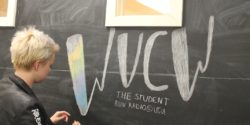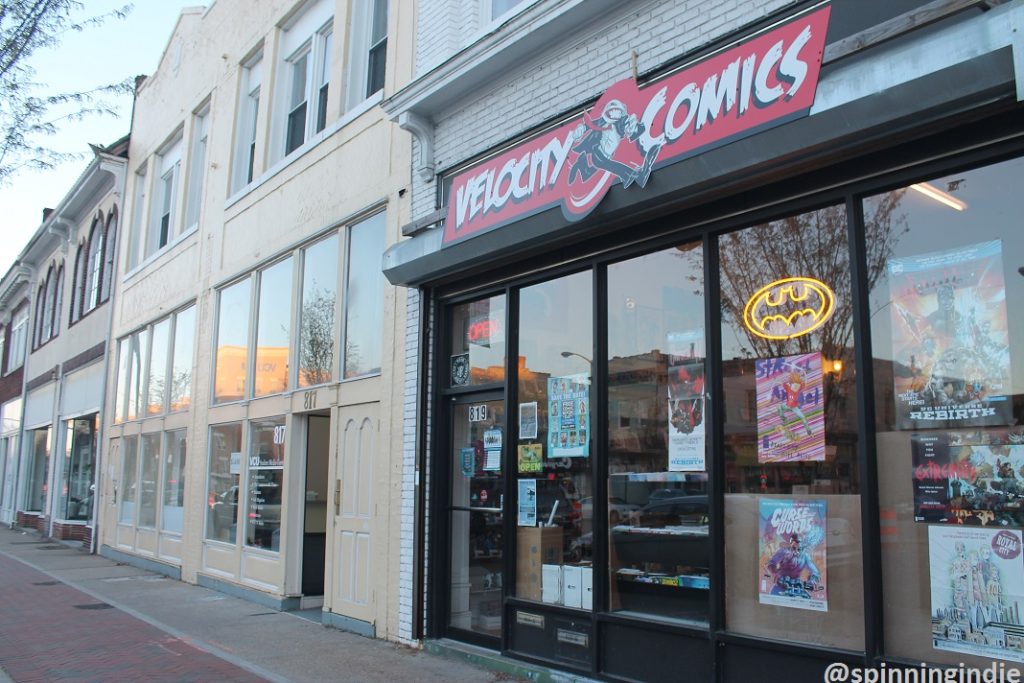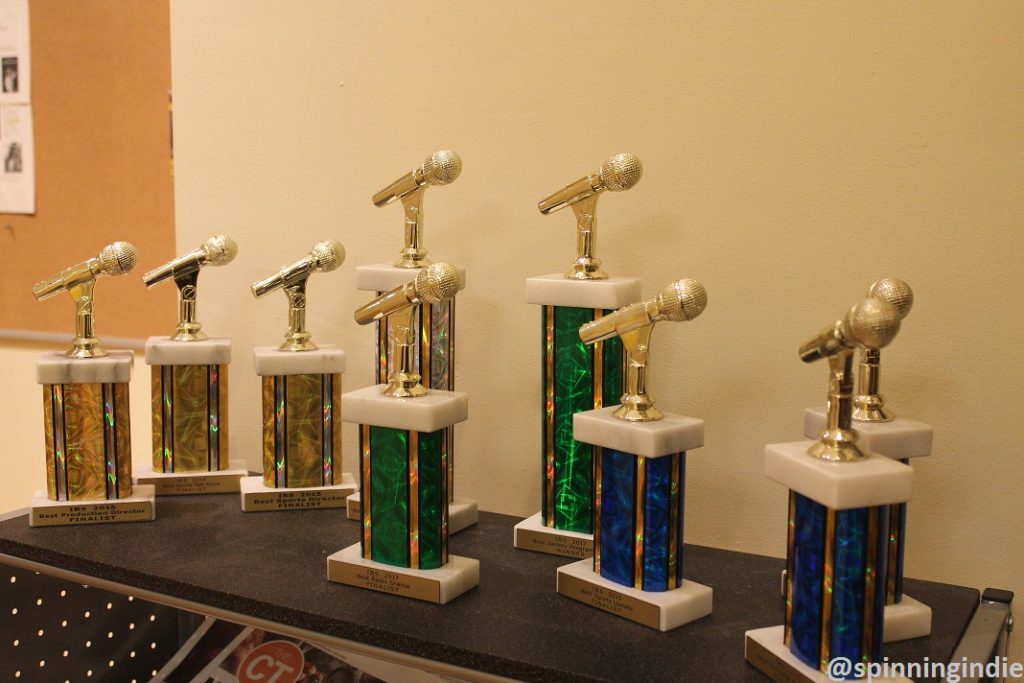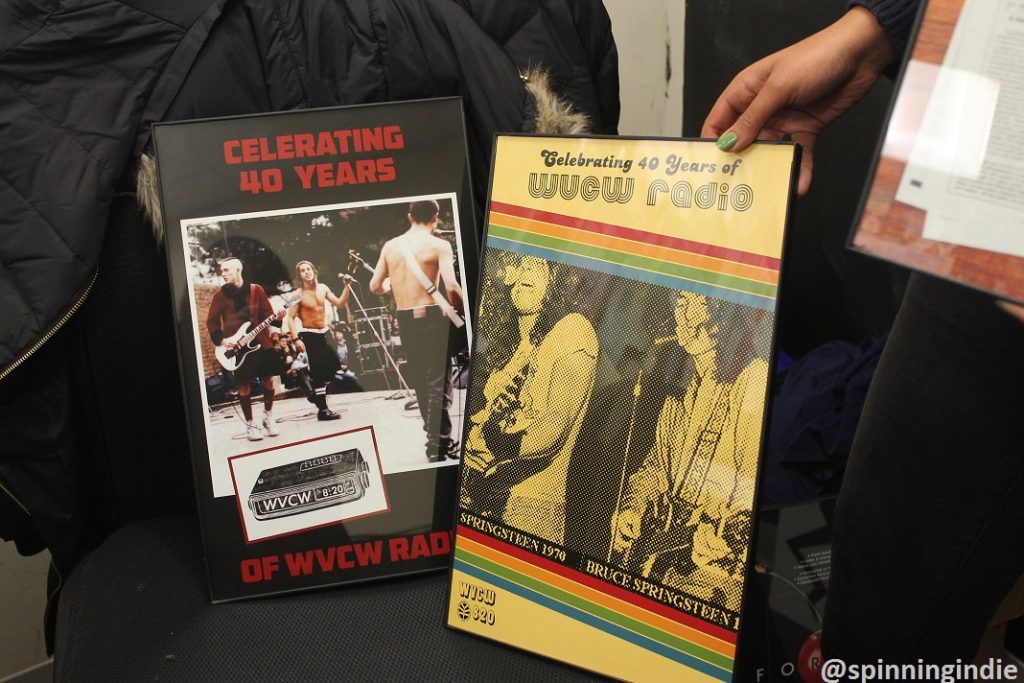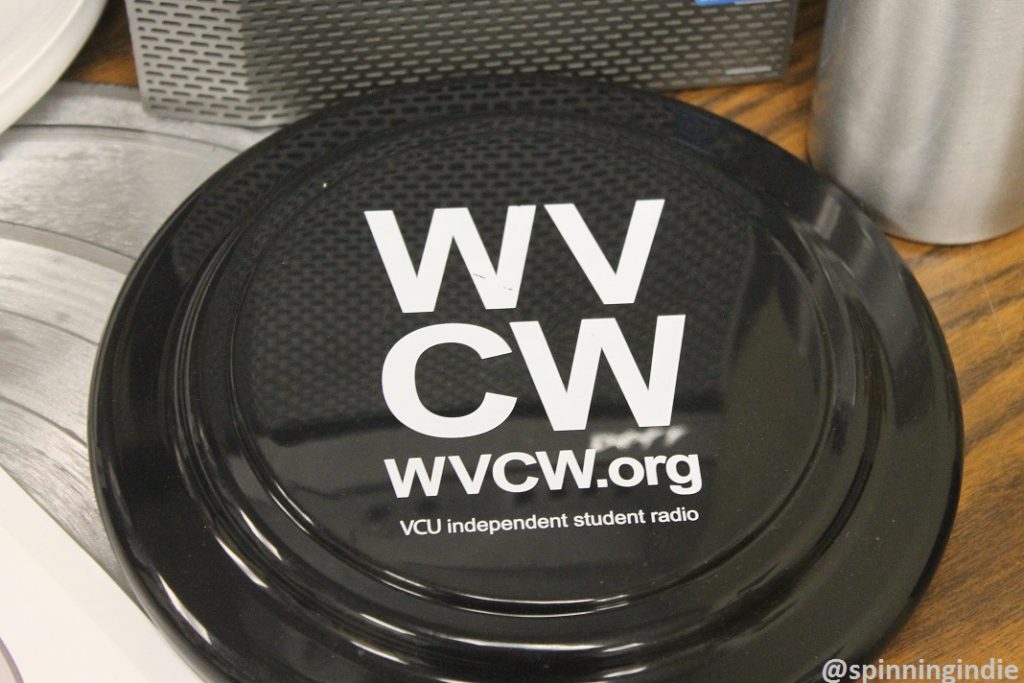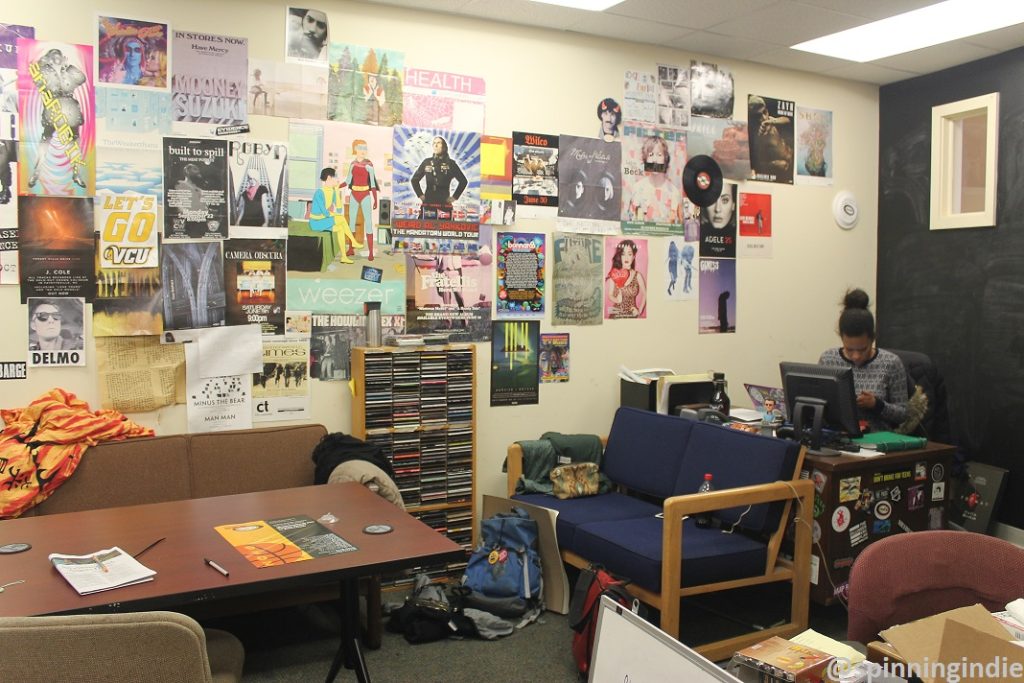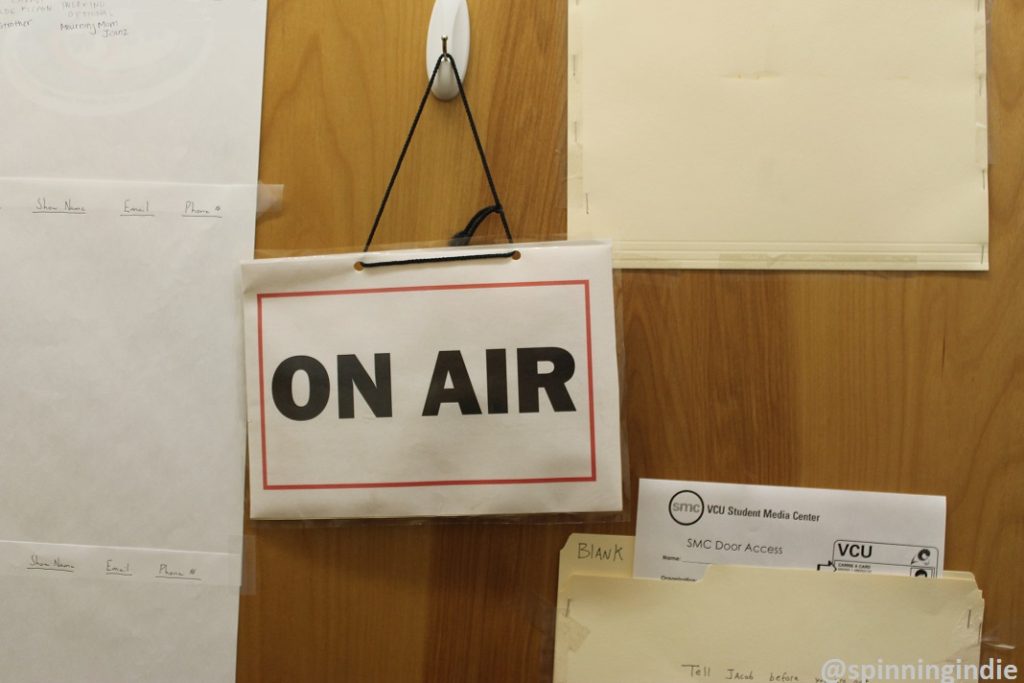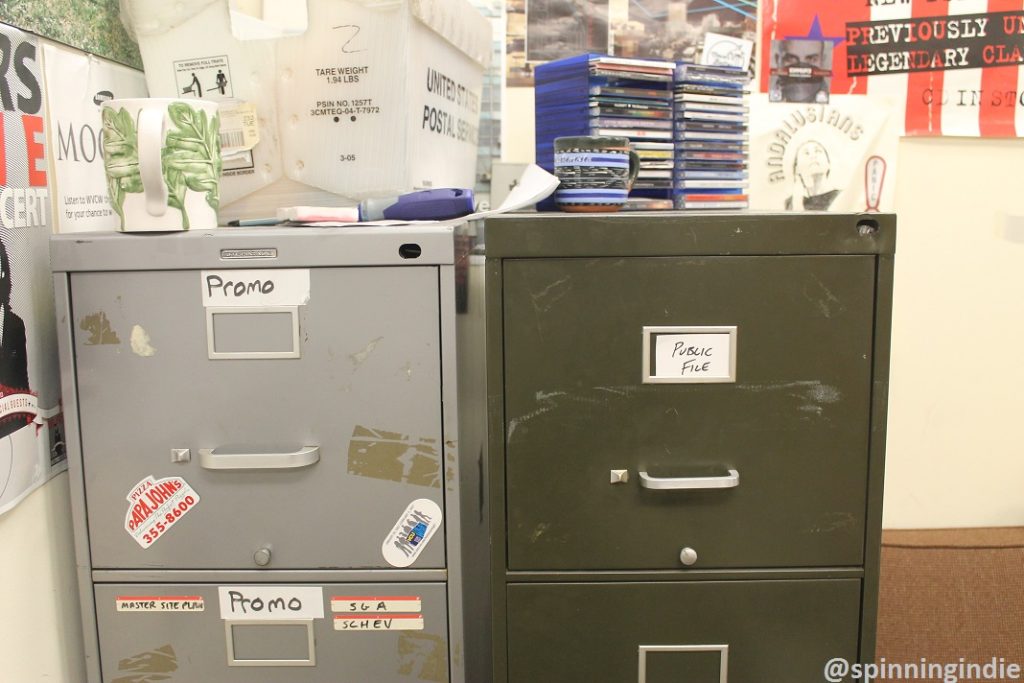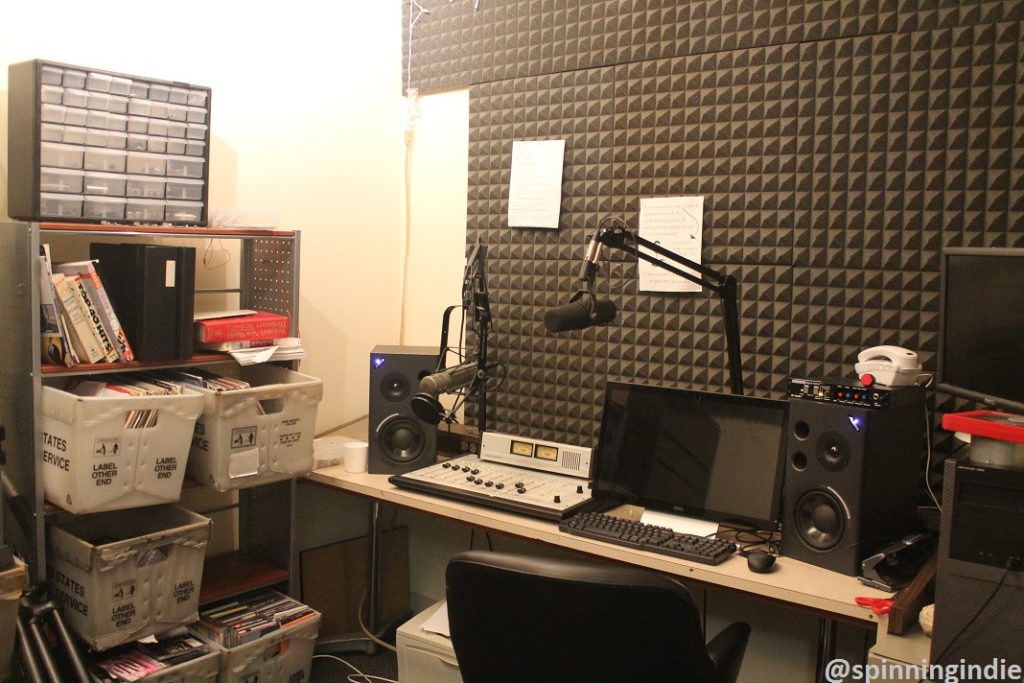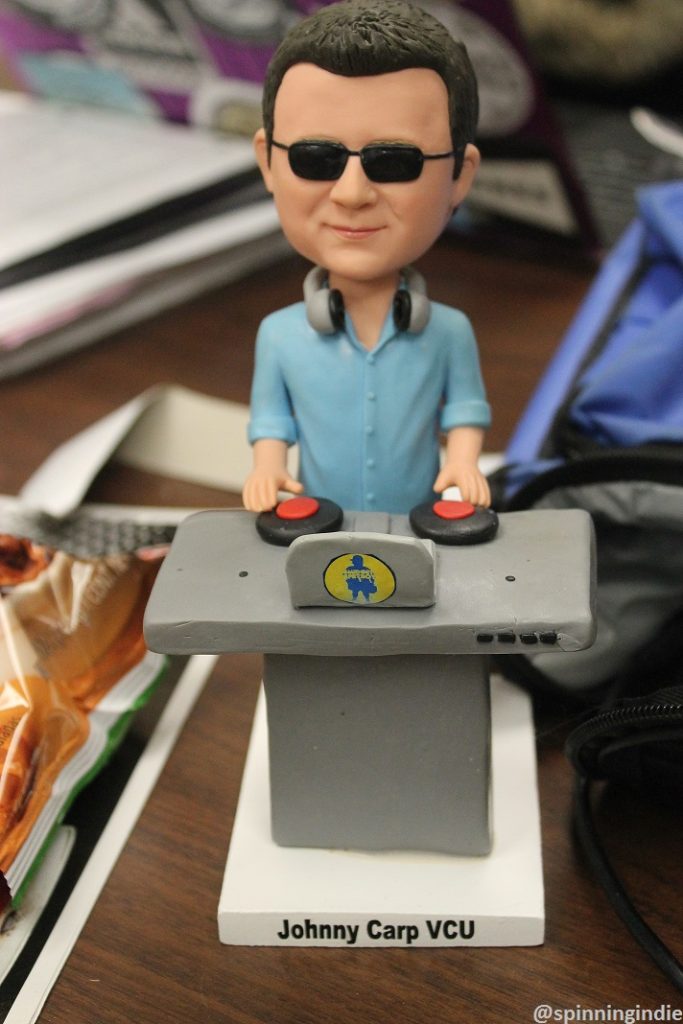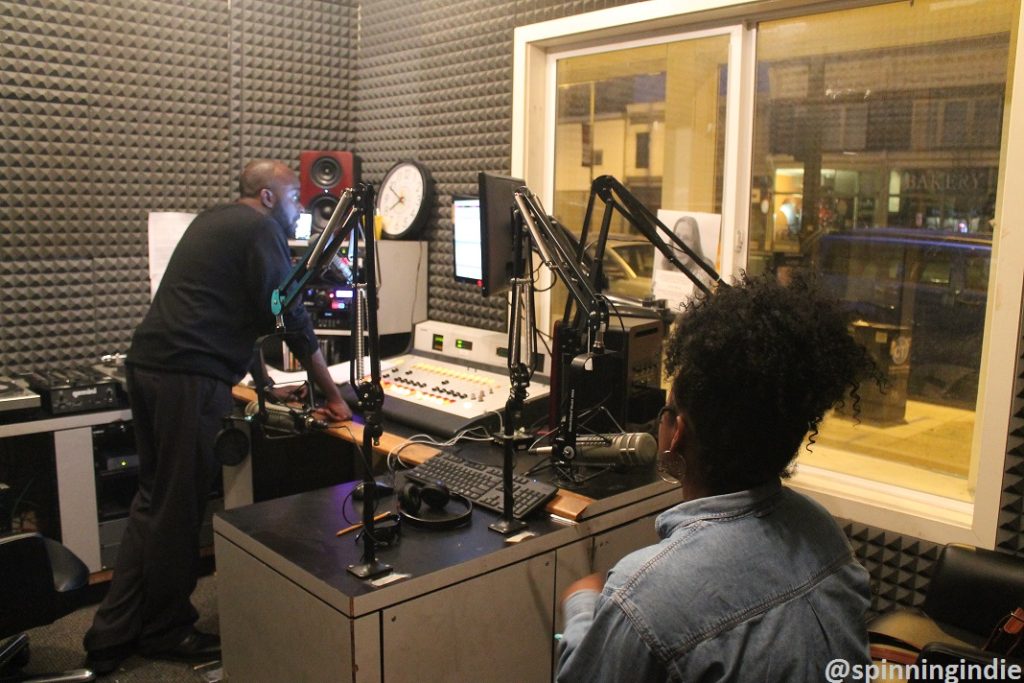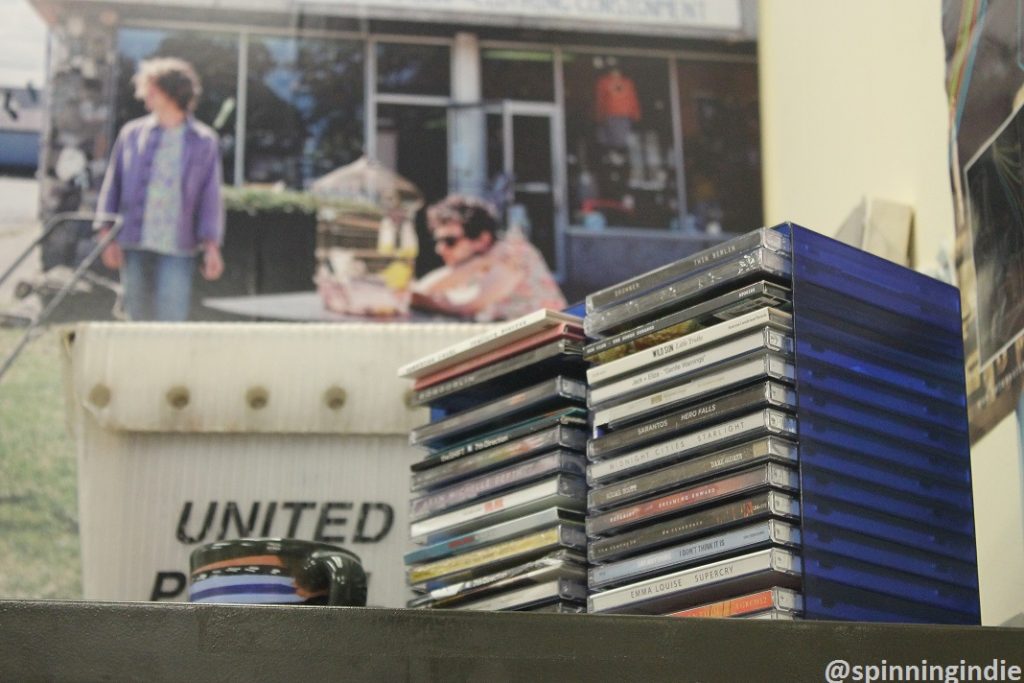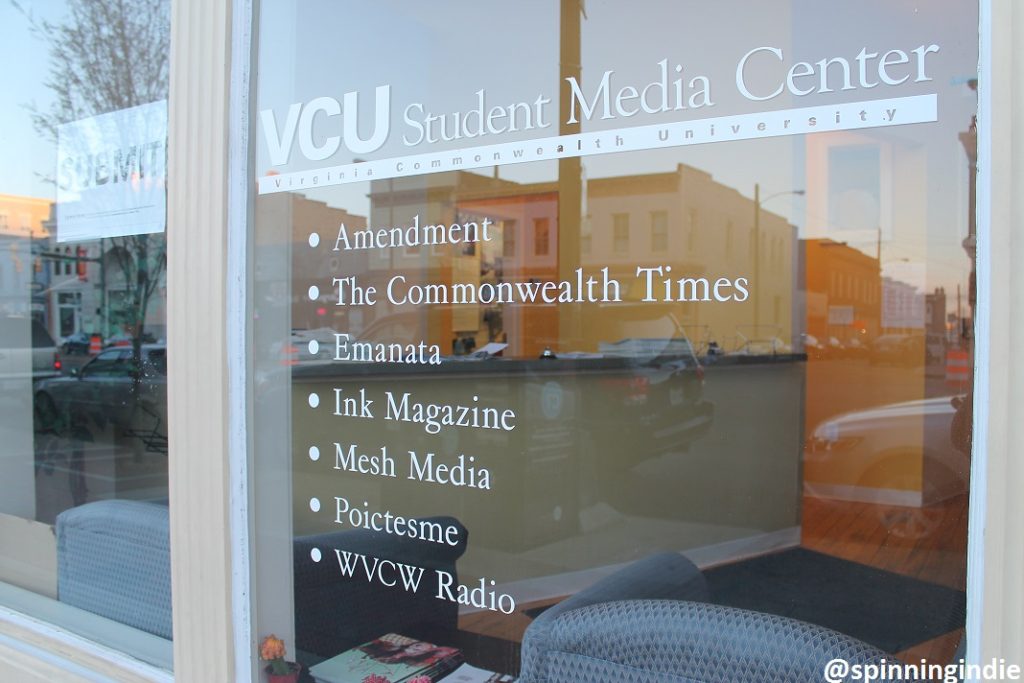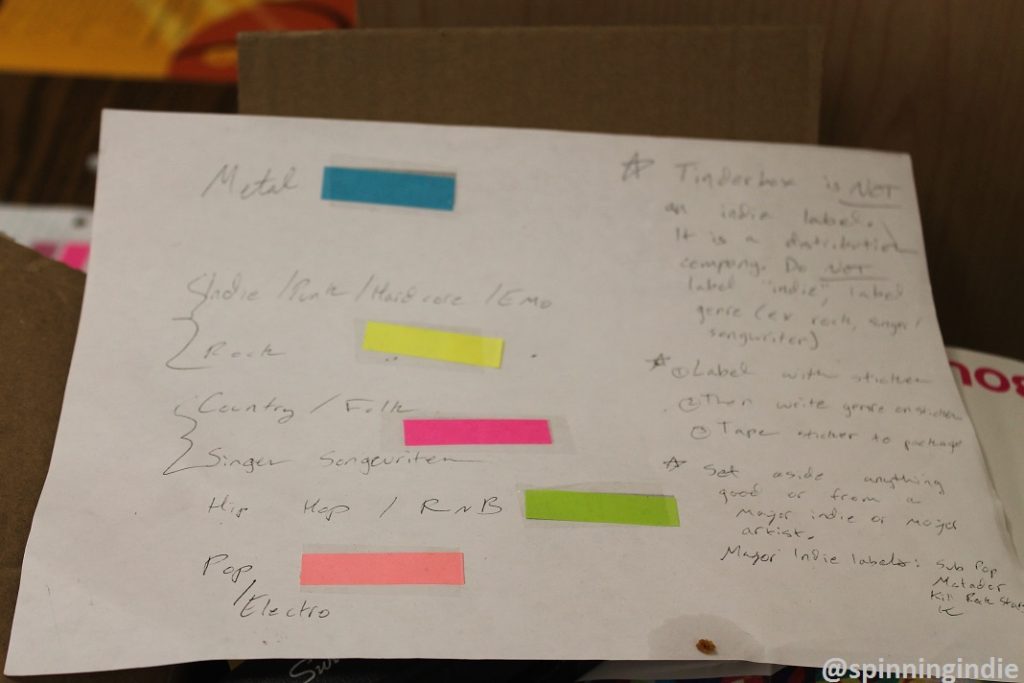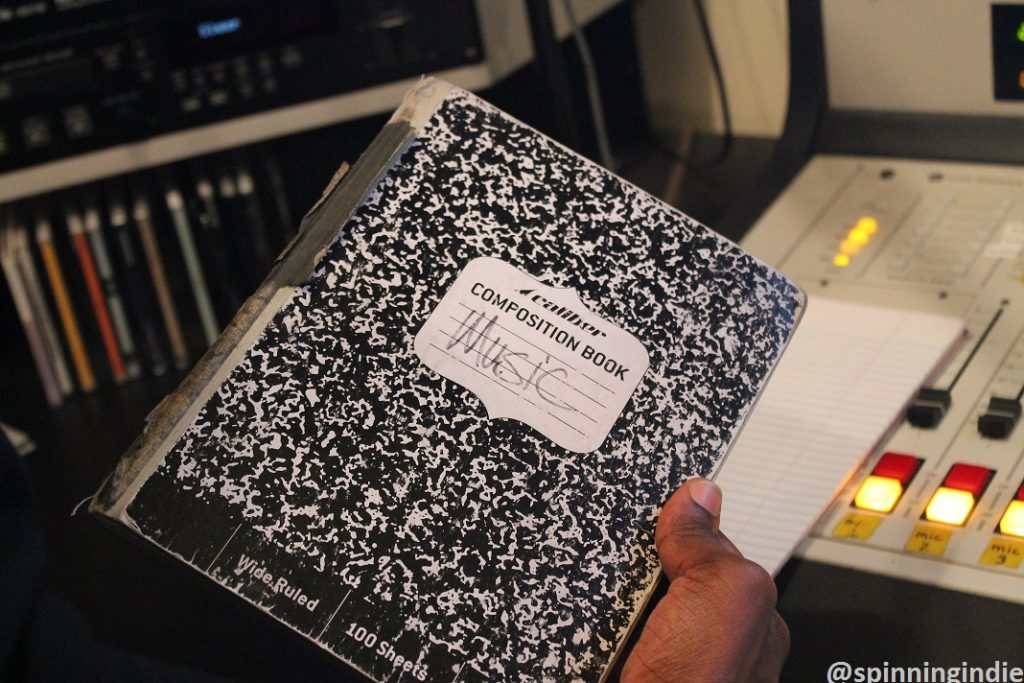I always relish the opportunity to visit more radio stations, so when I made plans to speak at WTJU’s college radio symposium in Virginia, I built in some time to tour a bunch of nearby stations. Soon after my flight landed in Richmond, Virginia on the night of Wednesday, March 15, I made my way to college radio station WVCW at Virginia Commonwealth University. Located on an urban campus in Richmond, the station is in a commercial district, with its on-air studio window overlooking Broad Street. Just down the street are some restaurants, a comic shop and a thrift store – staples for any collegiate neighborhood.
Programming Director Kiara Walker welcomed me to the station and we were soon joined by General Manager Alan Booth. Just back from a spring break trip to New York City for the Intercollegiate Broadcasting System (IBS) conference, both were excited to show off some of the awards that WVCW brought home from the event.
Staff were also preparing for a station alumni meet-up coming up that weekend and were in the midst of gathering some historic materials for it. Although the gathering was in honor of 40 years of WVCW, college radio at Virginia Commonwealth dates back even further and celebrates its 50th year in 2017.
According to the WJRB alumni website, student radio began at Virginia Commonwealth in 1967 with AM carrier current radio station WJRB. Students were able to tune in to the station from their dorm rooms and could also hear it in several cafeterias. The alumni site includes scans of vintage station posters, amazing studio photos from 1967, and some audio from the early days of the station. There’s even a photo of a super groovy radio station remote broadcasting van from the 1970s.
It was interesting to learn about WJRB’s underground music program, UGLY, which ran starting at midnight (listen to a clip here). According to the alumni website, “This was the cutting edge in radio in the entire country and the first in Richmond. Albums were the format and if it played on commercial radio, you probably wouldn’t hear it here.” Apparently that show’s progressive music ended up influencing the programming on nearby commercial radio stations. It also helped to get the station recognized by Billboard for being one of the four most innovative college radio stations in the country.
Around 1976, WJRB changed its name. The alumni website writes, “Desiring to align more closely with the new university, the station staff decided to select WVCU as the new station call letters. But the school administration decided to keep their options open for a future station not controlled by students and thus vetoed the desired call letters. The station decided with that line of thinking the station could select something different like WCVW. Of course, this was a little bit of an inside stab at the administration because everyone at the station knew the way the new call letters would be read on the air, “W-C-V-double U“. Thus student radio continued to march forward on the VCU campus into the crazy disco era.”
I was glad to learn that WVCW is working to document station history and build up its archives and it’s particularly impressive that they have a station archivist and very active alumni on Facebook (with a page and a group).
As far as methods of transmission, AM carrier current broadcasts continued for decades, with cable FM getting added in 1991. The station was online-only beginning in 2001 and in 2015 added evening FM broadcasts (6pm to 1am Monday through Thursday and 9pm to 1am on Fridays) over WHAN 102.9 FM through a lease agreement with its owner, WTJU.
When I asked if the night-time FM slots were coveted by DJs, Walker told me that some people really want to be on FM, but she acknowledged that if students want their friends to listen, it will most likely be online. Regardless, she added that FM is “cool to say.” Booth chimed in that people did fight for FM slots in the past. It’s important to note that WVCW recently reduced the number of DJs and shows because the schedule was getting unwieldy. In the prior semester there were 80 shows and the semester before that, there were 110.
With management listening to air checks for every show, the number of programs was becoming a burden on staff. This semester there are only 11 shows, with around 19 hosts. In order to keep participation up, WVCW decided to move away from individuals hosting shows. Booth said that it’s more of a “collaborative” format now, with show hosts working with producers, board operators and writers, depending on the type of program. WVCW is also supportive of shows having co-hosts.
While Booth opined that most college students don’t listen to radio, he nuanced that statement, saying that students do want to listen to “curated music.” When I asked about music discovery, Pandora came up and Walker joked that she probably hasn’t used it since 6th grade. Booth countered that, arguing that at his high school, kids were still using it. Today, Walker turns to Spotify and Soundcloud to find new music. She added that for more indie stuff, Bandcamp and Mixcloud are great sources. Booth concurred, pointing out that word of mouth is still a really important way to get turned on to music.
Nowadays, WVCW occupies a space in a building dominated by student media, with various publications down the hall and a TV studio upstairs. A student-run station, WVCW does have a handful of faculty advisers who help out with various tasks, including FCC compliance. Shows range from an electronic music show featuring live mixes to news and talk shows. The station also airs live sports.
While most on-air hosts are students, there are a few community member DJs/hosts, including Brandon Herbin, who was doing his long-time indie hip hop show, The Beacon Hill Project, when I stopped by. He is one of many WVCW DJs experimenting with live video and the night that I visited he was trying out Facebook live for the first time during his show, streaming video from the studio. Look closely at the end of his show and you can spy me doing my studio tour.
Another video project at WVCW is a live music series called “The Chalkboard Sessions.” Walker described it as their version of NPR’s “Tiny Desk Concerts,” except that the artists playing live at WVCW are positioned in front of the station’s large chalkboard. The very first session from last fall, featuring the band Cat Be Damned, actually earned the station an award at IBS. Typically, WVCW will live stream one song online or on social media as a teaser for an eventual edited video of the whole session. Booth said that the first Chalkboard Session was “eye opening,” telling me that it showed that WVCW could be more than a radio station. He was adamant that having active social media has helped to draw more listeners and cited video as being especially important as there is an “inevitable convergence” between radio and video streaming.
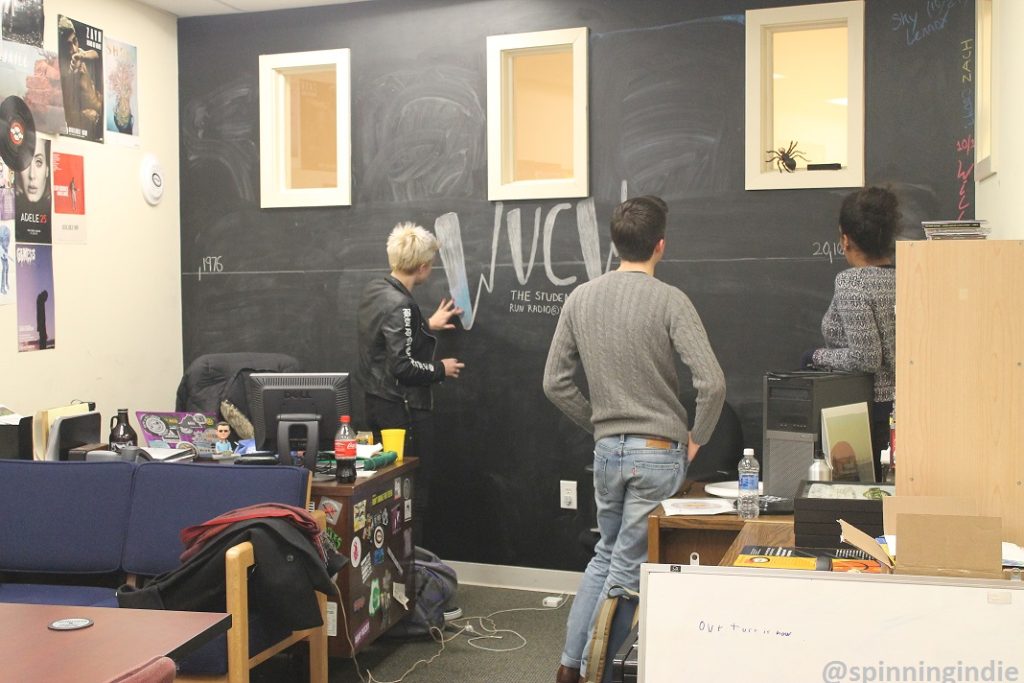
WVCW Promotions Director Laura Bryant draws a timeline on the chalk board while Alan Booth and Kiara Walker look on. Photo: J. Waits
Like many college radio stations, it’s the community of participants that is often one of the most beloved aspects of the experience. Walker joined WVCW as a freshman and said that she didn’t necessarily want to be on the air. She explained that she was drawn in by “the people that I thought would be here” and now couldn’t imagine being anywhere else.
Booth said that he was really proud of the diversity of the station’s staff. He explained that not only do people come from different backgrounds, with different world views, but that students represent a variety of majors. Walker said that a great thing about the station is that it gets people out of the “clique of their major.” Booth is a Biology major, Walker is an Environmental Studies major, and the station also has plenty of art majors. They explained that at many college radio stations it would be rare to have participants who weren’t communication majors, so they appreciated that WVCW is welcome to students with a range of academic interests. Booth said that he liked WVCW’s “culture of innovation” and added that experimentation is an important part of the station.
Thanks to Kiara Walker, Alan Booth and everyone else at WVCW for the visit and tour. As an added bonus, I was happy to see Walker and Booth a couple of days after my visit at WTJU’s College Radio: Then, Now, and Next symposium. This is my 123rd radio station field trip report, with more to come from my Virginia and Philadelphia-area travels. My most recent field trips can be found on Radio Survivor and a full list of all my station tour reports is compiled on Spinning Indie.

